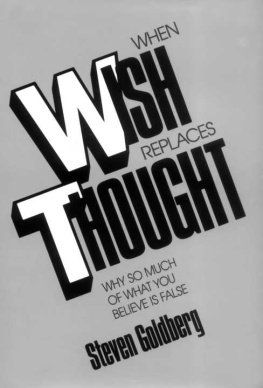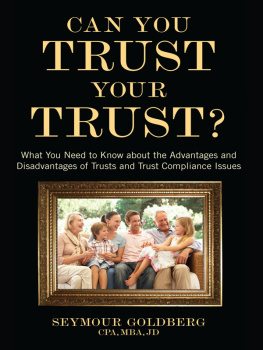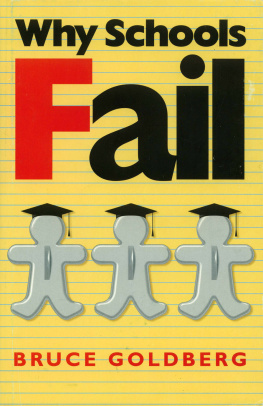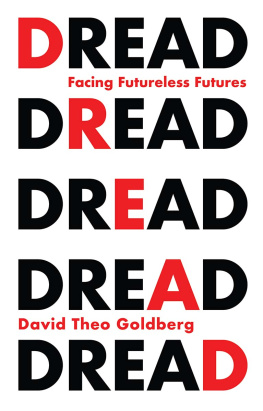Goldberg - When wish replaces thought: why so much of what you believe is false
Here you can read online Goldberg - When wish replaces thought: why so much of what you believe is false full text of the book (entire story) in english for free. Download pdf and epub, get meaning, cover and reviews about this ebook. City: Buffalo;N.Y, year: 1992;2009, publisher: Prometheus Books, genre: Politics. Description of the work, (preface) as well as reviews are available. Best literature library LitArk.com created for fans of good reading and offers a wide selection of genres:
Romance novel
Science fiction
Adventure
Detective
Science
History
Home and family
Prose
Art
Politics
Computer
Non-fiction
Religion
Business
Children
Humor
Choose a favorite category and find really read worthwhile books. Enjoy immersion in the world of imagination, feel the emotions of the characters or learn something new for yourself, make an fascinating discovery.
When wish replaces thought: why so much of what you believe is false: summary, description and annotation
We offer to read an annotation, description, summary or preface (depends on what the author of the book "When wish replaces thought: why so much of what you believe is false" wrote himself). If you haven't found the necessary information about the book — write in the comments, we will try to find it.
When wish replaces thought: why so much of what you believe is false — read online for free the complete book (whole text) full work
Below is the text of the book, divided by pages. System saving the place of the last page read, allows you to conveniently read the book "When wish replaces thought: why so much of what you believe is false" online for free, without having to search again every time where you left off. Put a bookmark, and you can go to the page where you finished reading at any time.
Font size:
Interval:
Bookmark:



OF WHAT YOU
BELIEVE IS FALSE
Bteven 6oIderg
For Liz, Alan, and Joan
The life which is unexamined is not worth living.
-Socrates, Apology
The moment a man questions the meaning and value of life, he is sick ...
-Freud (Letter to Marie Bonaparte, August 13, 1937)
In addition to those to whom this and my first book are dedicated, there are a few people who were so generous that they deserve special mention:
Michael Cooperstein and Carol Saltus, whose comments often directed attention to whole areas that I had left unexamined and that demanded analysis.
Helen Hans, William Helmreich, Francis Wilson, and Jack Winter for comments on specific subjects discussed in this book and for general suggestions about its presentation.
Ibtihaj Arafat, Pnina Bright, Neil Epstein, William Fishbein, Willie Flower, Ernest van den Haag, Henny Helmreich, Jeffrey Rosen, Faith Scheer, Susan Thomas, and Ruth Wolff all offered suggestions so illustrative of their individual gifts that it is unfair that space requires they be grouped in a way that camouflages the uniqueness of each of their contributions.
Paul Kurtz, Bob Basil, and the good people at Prometheus, who are among the few in publishing who really do believe that every voice has a right to be heard and without whom this book would not have seen the light of day.
Steven Goldberg
New York, New York
November 16, 1991
PART 1: WHY WE BEHAVE AS WE DO
PART 2: WHY WE VIEW THE WORLD AS WE DO
This book is an attempt to understand aspects of how the world works and our method for understanding how the world works. Save for a few chapters that address purely logical aspects of social questions, these chapters all concern the causes of behavior-the factors that facilitate and encourage specific forms of behavior and the factors that retard and discourage such behavior. These chapters are not concerned with moral assessments of the behavior or political prescriptions for social policies.
This book addresses empirical (and related logical) questions that are capable of eliciting the strongest of emotions. These emotions are capable of generating a substitution of wish for thought. It is the purpose of this book to demonstrate the fallacy and error in "answers" to the questions addressed, fallacy and error that would never infiltrate explanations of unemotional issues. In many cases this book attempts to offer alternative explanations that are without fallacy and error.
This book assumes that acceptance of the faulty explanation is never justifiable on political or moral grounds, and that no claim of a (putative) social or political consequence of the acceptance of a correct explanation ever justifies rejection of that explanation.
This book is not an attempt to persuade the reader to accept one or another side on any moral or political issue. It is axiomatic (at least in the world of the empiricist) that "is cannot generate ought" and that no explanation of the world can entail a moral or political view of the world. Moral and political views require something in addition to logic and fact, some subjective impulse giving direction. Nature, the logic that gives order to nature and makes nature comprehensible, and the science that attempts to explain nature-none of these can provide the subjective impulse required to give the direction that defines the moral or political view.
Thus, for example, one can accept all that I write on the causation of differences of male and female behavior and feel that this suggests that we should have a sexual equal rights law. A view of this sort might give priority to a need to limit the behavioral advantage for attaining high positions that flows from male physiology in a world where aggressive incompetence often attains a higher position than does cooperative competence. It might do this to meet the demands of a sense of justice or to increase economic efficiency or to accord with some other impulse and goal.
One can, on the other hand, accept all that I write on the subject and feel that this suggests that we should not have a sexual equal rights law. A view of this sort might give priority to a need to emphasize sexual differences in order to give focus to the amorphous tendencies the infant brings to a world in which role models are hard to come by. It might do this to facilitate the development of strong integration of personality or to render concordant aptitude and ambition or to accord with some other impulse and goal.
Nothing I write favors one of these views over the other. However, all that I write-to the extent that it is correct-sets limits on the empirical claims that one making a moral or political argument can make. It is perfectly legitimateI believe preferable-for one who attempts to explain how the world does work to ignore all questions about how the world should work. But one who would tell us how the world should work is committed-if one wishes us to believe that one's recommendations can be effectuated in the real world-to refusing to misrepresent how the world does work.
For reasons of readability, in this section I refer to all positions to the right of center as "conservative" and all to the left of center as "liberal." This is not meant to distinguish the political conservative from those further right or the political liberal from those further left; indeed, the things I say here tend to be more true as one moves further from the center in each direction. It is simply a way of avoiding repetition of the phrases "those to the right" and "those to the left."
I emphasize all this for two reasons:
(1) It may well strike the reader that my work seems often to reach conclusions that are more acceptable to the conservative than to the liberal.
It is true beyond question that these chapters-though not the empirical approach that infuses them-will be welcomed more by the conservative than by the liberal. But the reason that this is the case has nothing to do with any tendency of mine to favor conservative moral or political views. The reason is rooted ina difference between conservative and liberal arguments.
Possibly because the roots of conservatism, both historical and contemporary, are often embedded in religious soil, the conservative feels at home with arguments that are clearly based on assumptions that are, from a logical and scientific point of view, arbitrary and subjective (i.e., founded on values).
The liberal, whose positions are, in reality, no less and no more subjectively anchored than are those of the conservative (or anyone else making a moral or political argument), has been far more greatly affected by the empiricism that stresses the distinction between the scientific and the moral-political. The liberal is far more often loathe to acknowledge the subjective nature of his argument because he feels in his bones that, once the subjective nature of his assumptions is exposed, no one will feel compelled to accept his argument.
Font size:
Interval:
Bookmark:
Similar books «When wish replaces thought: why so much of what you believe is false»
Look at similar books to When wish replaces thought: why so much of what you believe is false. We have selected literature similar in name and meaning in the hope of providing readers with more options to find new, interesting, not yet read works.
Discussion, reviews of the book When wish replaces thought: why so much of what you believe is false and just readers' own opinions. Leave your comments, write what you think about the work, its meaning or the main characters. Specify what exactly you liked and what you didn't like, and why you think so.















